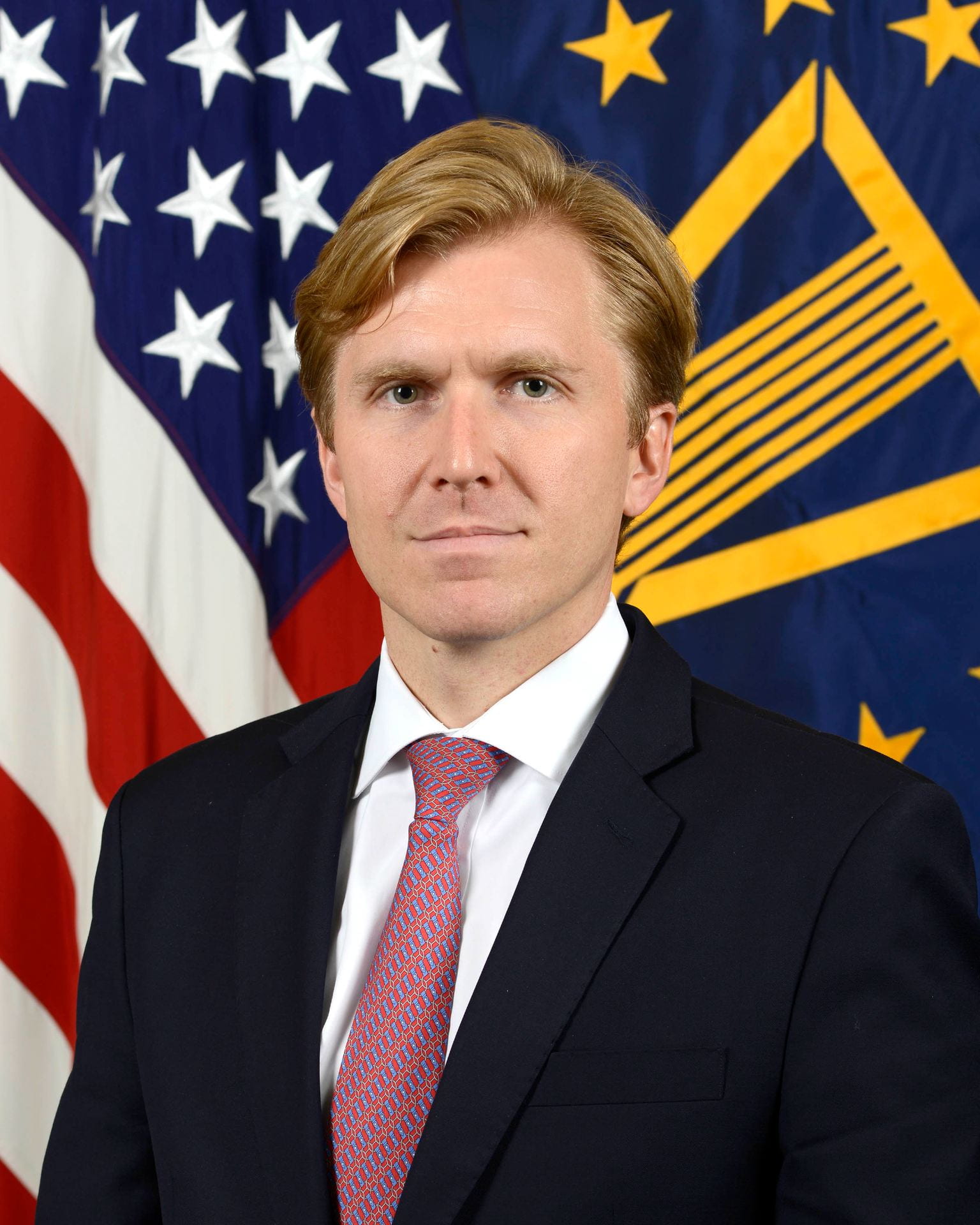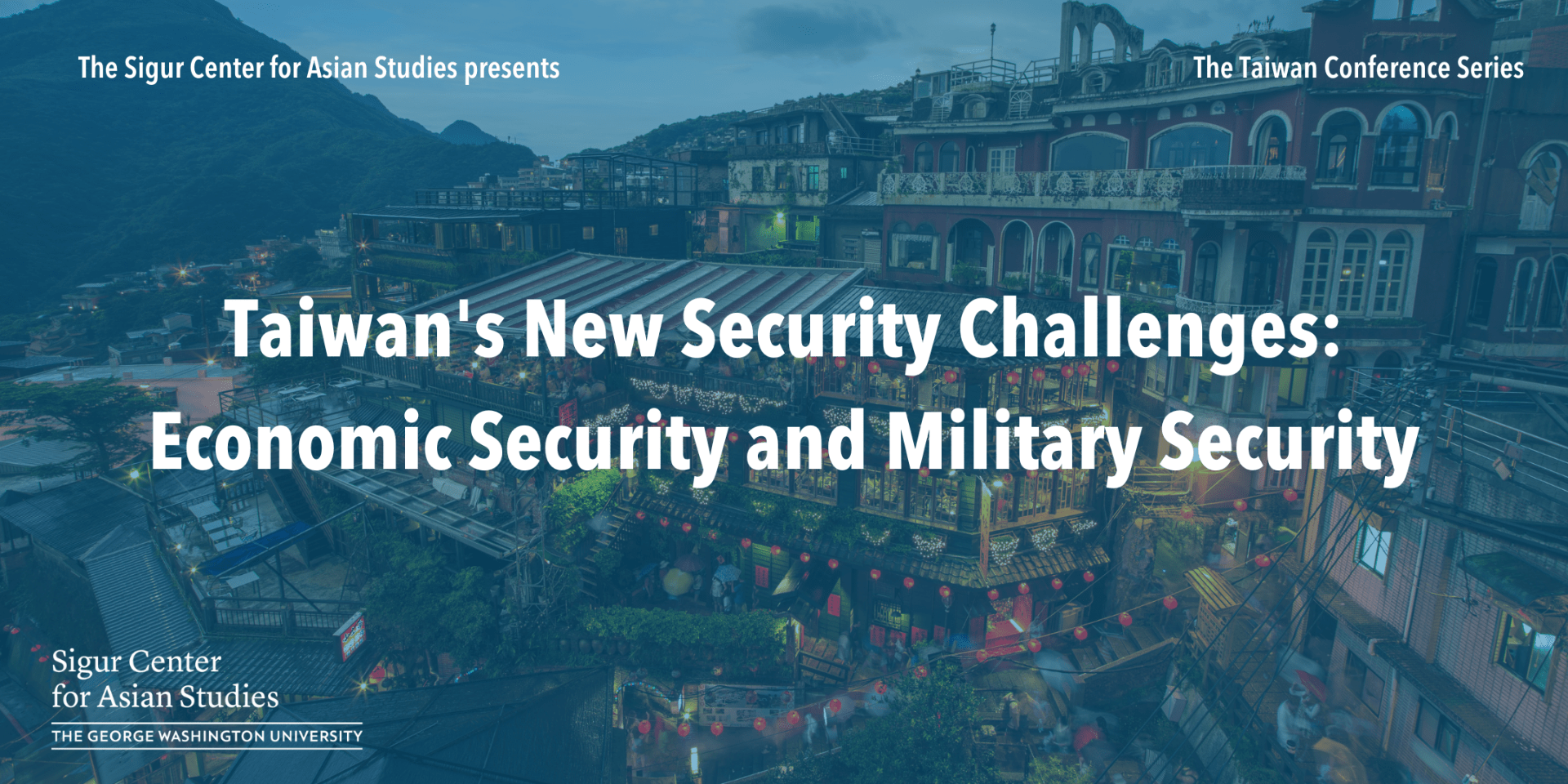Thursday, September 29, 2022
10:30 AM – 2:00 PM EDT
State Room, 7th Floor
Elliott School of International Affairs
1957 E ST NW, Washington, DC 20052
Taiwan is increasingly being tested by both military and economic security pressures from China. Beijing’s stepped-up manned and unmanned military activities and imposition of greater economic and military costs on other countries engaging in otherwise regular diplomatic and international engagement with Taiwan since August poses serious challenges to the rules-based international order, undermine the status quo across the Taiwan Strait, destabilize the Indo-Pacific region, and negatively impact international trade and transit. Combined with intense cybersecurity challenges, supply chain pressures and US-China tech competition, Taiwan faces a unique set of economic and military security challenges that are increasingly recognized and shared by like-minded partners in the region as well as across the globe.
Experts at the conference will offer their views on key economic and military issues currently facing Taiwan, and the prospects for Cross-Strait and regional stability.
Registration is free and open to the public. This event is IN-PERSON only. Lunch is provided.
This event will be recorded and will be available on the Sigur Center YouTube channel after the event.
Agenda
10:30am – 12:00pm – Panel One | Economic Security: Supply Chain Resilience, Cybersecurity & US-Taiwan Ties
- Rupert Hammond-Chambers, US-Taiwan Business Council (USTBC) | Supply Chain Resilience
- Fiona Cunningham, University of Pennsylvania | Cybersecurity Challenges
- Emily Weinstein, Georgetown University | U.S.-China Tech Competition and Implications for Taiwan
- Moderator: Gregg Brazinsky, Sigur Center for Asian Studies, George Washington University
12:00pm – 12:30pm Lunch
12:30pm – 2:00pm – Panel Two | Military Security: Cross Strait Relations, Defense & US-Taiwan Relations
- Elbridge Colby, The Marathon Initiative | Interpreting Cross Strait Tensions
- Robert Sutter, George Washington University | Drivers of US-Taiwan Relations
- Jacob Stokes, Center for a New American Security | Taiwan’s Strategic and Political Impact on the Indo-Pacific
- Moderator: Deepa Ollapally, Sigur Center for Asian Studies, George Washington University
Panel One Speakers
Rupert Hammond-Chambers is President of the US-Taiwan Business Council. He began working for the US-Taiwan Business Council in October 1994. In March of 1998, he was promoted to Vice President of the Council with additional responsibilities for office management, oversight of the staff, financial bookkeeping and a clear mandate to build out the Council’s member/client base.
Mr. Hammond-Chambers was elected President of the Council in November 2000. As the trade relationship between the United States, Taiwan and China continues to evolve, he has worked to develop the Council’s role as a strategic partner to its members, with the continuing goal of positioning the Council as a leader in empowering American companies in Asia through value and excellence.
Mr. Hammond-Chambers is also the Managing Director, Taiwan for Bower Group Asia – a strategic consultancy focused on designing winning strategies for companies. He is also responsible for Bower Group Asia’s defense and security practice.
He sits on the Board of The Project 2049 Institute. He is a Trustee of Friends of Fettes College, and is a member of the National Committee on United States-China Relations.

Fiona Cunningham is Assistant Professor of Political Science at the University of Pennsylvania. She is also a Faculty Fellow at Perry World House and affiliated with the Center for the Study of Contemporary China and the Christopher H.. Browne Center for International Politics at the University of Pennsylvania. Her research interests lie the intersection of technology and conflict, with an empirical focus on China. Fiona’s current book project explains how and why China threatens to use space weapons, cyber attacks and conventional missiles as substitutes for nuclear threats in limited wars. Her research has been published in International Security, Security Studies, The Texas National Security Review, and The Washington Quarterly, and has been featured in the New York Times and the Economist. Fiona’s work has been supported by the Stanton Foundation, Smith Richardson Foundation, and the China Confucius Studies Program. She has held fellowships at the Renmin University of China in Beijing, the Belfer Center for Science and International Affairs at Harvard University, the Center for International Security and Cooperation at Stanford University, and the Carnegie Endowment for International Peace. Fiona received her Ph.D. in Political Science from MIT in 2018. She holds a Bachelor of Arts from the University of New South Wales and a Bachelor of Laws from the University of Sydney, both with first class honors. From 2019 to 2021, she was an Assistant Professor of Political Science and International Affairs at the George Washington University.

Emily S. Weinstein is a Research Fellow at Georgetown’s Center for Security and Emerging Technology (CSET), focused on U.S. national competitiveness in AI/ML technology and U.S.-China technology competition. She is also a Nonresident Fellow at the Atlantic Council’s Global China Hub and the National Bureau of Asian Research. In her previous role at CSET, Emily conducted research on China’s S&T ecosystem, talent flows, and technology transfer issues. Emily has previously testified before the U.S.-China Economic and Security Review Commission and the Wisconsin State Legislature’s Senate Committee on Universities and Technical Colleges. She has written on topics related to research security and China’s S&T developments in Foreign Policy, Lawfare, DefenseOne, and other outlets. Emily holds a BA in Asian Studies from the University of Michigan and an MA in Security Studies from Georgetown University.
Panel One Moderator

Gregg Brazinsky is Professor of History and International Affairs. He is director of the Asian Studies Program, acting director of the Sigur Center for Asian Studies, and acting co-director of the East Asia National Resource Center. He is the author of two books: Nation Building in South Korea: Koreans, Americans, and the Making of a Democracy and Winning the Third World: Sino-American Rivalry during the Cold War. His articles have appeared in numerous journals including Diplomatic History and the Journal of Korean Studies. He has written op-eds for The Washington Post, The Chicago Tribune and several other media outlets. He is currently working on two books. The first explores American nation building in Asia–especially Japan, Taiwan, and South Korea. The second explores Sino-North Korean relations during the Cold War.
Panel Two Speakers

Elbridge Colby is co-founder and principal of The Marathon Initiative, a policy initiative focused on developing strategies to prepare the United States for an era of sustained great power competition. He is the author of The Strategy of Denial: American Defense in an Age of Great Power Conflict (Yale University Press), which The Wall Street Journal selected as one of the top ten books of 2021.
Previously, Colby was from 2018-2019 the Director of the Defense Program at the Center for a New American Security, where he led the Center’s work on defense issues.
Before that, he served as the Deputy Assistant Secretary of Defense for Strategy and Force Development from 2017-2018. In that role, he served as the lead official in the development and rollout of the Department’s preeminent strategic planning guidance, the 2018 National Defense Strategy (NDS). The NDS shifted the Department of Defense’s focus to the challenges to U.S. military superiority and interests posed by China in particular followed by Russia, prioritizing restoring the Joint Force’s warfighting edge against these major power competitors. He also served as the primary Defense Department representative in the development of the 2017 National Security Strategy.

Robert Sutter is Professor of Practice of International Affairs at the Elliott School of George Washington University (2011-Present). He also served as Director of the School’s main undergraduate program involving over 2,000 students from 2013-2019. His earlier full-time position was Visiting Professor of Asian Studies at Georgetown University (2001-2011). A Ph.D. graduate in History and East Asian Languages from Harvard University, Sutter has published 22 books (four with multiple editions), over 300 articles and several hundred government reports dealing with contemporary East Asian and Pacific countries and their relations with the United States. His most recent book is Chinese Foreign Relations: Power and Policy of an Emerging Global Force, Fifth Edition (Rowman & Littlefield, 2021). Sutter’s government career (1968-2001) saw service as senior specialist and director of the Foreign Affairs and National Defense Division of the Congressional Research Service, the National Intelligence Officer for East Asia and the Pacific at the US Government’s National Intelligence Council, the China division director at the Department of State’s Bureau of Intelligence and Research and professional staff member of the Senate Foreign Relations Committee.

Jacob Stokes is a Fellow for the Indo-Pacific Security Program at the Center for New American Security, where his work focuses on U.S.-China relations, Chinese foreign policy, East Asian security affairs, and great-power competition. He previously served in the White House on the national security staff of then-Vice President Joseph R. Biden, where Stokes was senior advisor to the national security advisor, as well as acting special advisor to the vice president for Asia policy. He has also worked in the U.S. Congress as a professional staff member for the U.S.-China Economic and Security Review Commission, and as foreign and defense policy advisor for Senator Amy Klobuchar (D-MN).
Outside of government, Stokes has been a senior analyst in the China program at the U.S. Institute of Peace and with the National Security Network. His writing has appeared in Foreign Affairs, Lawfare, Politico Magazine, War on the Rocks, Democracy, The Washington Quarterly, and The Guardian, and his analysis has been featured in TIME, USA Today, The Economist, The Washington Post, The Los Angeles Times, Vox, and Bloomberg. Stokes is a Term Member of the Council on Foreign Relations. He holds an MA from the Walsh School of Foreign Service at Georgetown University and undergraduate degrees from the University of Missouri.
Panel Two Moderator

Deepa M. Ollapally is a political scientist specializing in Indian foreign policy, South Asian security, India-China relations, and Indo-Pacific regional and maritime security. She also directs the Rising Powers Initiative, a major research program which tracks and analyzes foreign policy debates in aspiring powers of Asia and Eurasia. She is the author of five books and is currently working on a manuscript titled Big Power Competition for Influence in the Indo-Pacific, which assesses the shifting patterns of geopolitical influence by major powers in the region since 2005 and the drivers of these changes. She holds a Ph.D. in Political Science from Columbia University.




